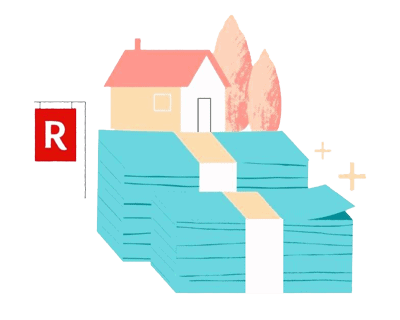In this Redfin article, we’ll break down mortgage interest, covering how it works, what influences it, and how it impacts your payments. With mortgage rates dropping, now is the perfect time to understand these changes and take advantage of this opportunity if you’re looking to buy.
So whether you’re searching for a condo in New York or a home in Los Angeles, read on to learn everything you need to know about mortgage interest.

What is mortgage interest and how does it work?
Mortgage interest is the fee you pay for borrowing money to buy a home. It’s calculated as a percentage of the loan amount and is paid over the life of the mortgage. This interest rate can be fixed or adjustable and is added to your monthly payments throughout the loan term.
For example, with a $400,000 mortgage at a fixed 5% interest rate, you would pay $20,000 in interest the first year. As you repay the principal, the interest portion of your payments will decrease.
The total interest paid depends on several factors:
- Loan amount: Higher amounts result in more interest.
- Interest rate: Higher rates increase borrowing costs.
- Loan term: Longer terms reduce monthly payments but increase total interest.
- Interest rate type: Fixed or adjustable rates affect total interest.
How are mortgage rates determined?
Mortgage lenders, such as Bay Equity, set rates on a borrower-by-borrower basis, influenced by both market and personal factors. Here’s how these factors break down:
Market factors
Before considering individual borrower details, mortgage rates are affected by broader financial elements, including:
- Inflation: Higher inflation generally leads to higher mortgage rates.
- U.S. economic growth: Strong economic growth can push rates up.
- Housing market conditions: An increasing number of homes for sale can increase rates.
- Employment rates: Low unemployment can contribute to higher rates.
Conversely, when the economy slows down, unemployment rises, inflation decreases, or the housing supply tightens, mortgage rates tend to decrease. Recently, we’ve seen mortgage rates dropping, which presents a unique opportunity for homebuyers to secure favorable financing terms.
Personal Factors
Once market factors set the baseline, your specific rate is influenced by how risky the lender considers your loan. Key personal factors include:
- Credit score: Higher credit scores often secure lower interest rates.
- Loan type and terms: Different loan types (fixed, ARM, FHA, VA) and terms come with varying rates.
- Down payment amount: A larger down payment can lower your rate as it reduces the lender’s risk and the amount you need to borrow..
- Debt-to-income ratio: Lower ratios typically result in better rates.
- Work history: Stable employment can also favorably impact your rate.
The riskier the loan appears to the lender, the higher the interest rate will be. For instance, a borrower with an excellent credit score and a substantial down payment is seen as less likely to default, and thus, may be offered a more favorable interest rate.

How mortgage rates dropping impacts your buying power
With mortgage rates currently dropping, it’s an opportune time for prospective homebuyers to consider making their move. Lower mortgage rates mean that you could secure a more affordable monthly payment and potentially qualify for a larger loan amount than you would at higher rates. This decrease in rates can open up possibilities for purchasing homes that may have previously seemed out of reach.
Why should you act now?
- Affordability: Lower interest rates reduce your monthly payments, making it easier to manage your mortgage and free up more of your budget for other expenses or investments.
- Increased buying power: With lower rates, you might qualify for a higher loan amount, giving you more options in the housing market.
- Long-term savings: Locking in a lower interest rate can save you tens of thousands of dollars over the life of your loan.
- Competitive advantage: As more buyers enter the market to take advantage of lower rates, acting quickly can help you secure your dream home before competition increases.
However, it’s important to weigh the benefits of acting now against your long-term financial goals. Consult with a mortgage advisor to understand how these rate changes impact your specific situation and make an informed decision.
How do different loan types affect mortgage interest?
Fixed-rate mortgages (FRMs)
In a fixed-rate mortgage, the interest rate is locked in for the entire term of the loan. Your monthly payments remain consistent, providing stability and predictability. Given the current situation of dropping rates, locking in a low rate with a fixed-rate mortgage could be particularly advantageous.
Example: A $400,000 fixed-rate mortgage at 5.5% for 30 years will have consistent monthly payments. Initially, a larger portion of each payment goes toward interest, but over time, more of the payment goes toward repaying the principal.
Adjustable-rate mortgages (ARMs)
Adjustable-rate mortgages have interest rates that change periodically based on market conditions. ARMs typically offer lower initial rates, which can make them attractive if you plan to sell or refinance before the rate adjusts.
Example: A $400,000 five-to-one-year ARM might start with a 4% interest rate for five years. After that, the rate could adjust annually, potentially increasing in subsequent years. Your monthly payment would adjust accordingly, starting lower and increasing as the interest rate changes.
Interest-only mortgages
Interest-only mortgages allow you to pay only the interest for a set period, resulting in lower initial payments. This option is usually reserved for high-income borrowers or those with irregular incomes. However, these loans can be risky as you don’t build equity during the interest-only period.
Example: A $400,000 interest-only mortgage at 5% for the first 5 years would have lower initial monthly payments. After the interest-only period, payments will increase significantly as you begin to pay off the principal.
Jumbo mortgage loans
Jumbo mortgages are for loan amounts exceeding the conforming loan limits, which are set annually. These loans can be fixed or adjustable and typically have higher interest rates due to their larger size.
Example: A $1,000,000 jumbo loan with a fixed interest rate of 4.75% for 30 years would have higher monthly payments compared to standard conforming loans. Due to the larger loan amount, the interest rate and monthly payments are typically higher.
Why it’s important to understand how mortgage interest works
The difference between a 3.5% and a 4% mortgage interest rate might not seem significant at first glance, but that 0.5% can either save or cost you thousands of dollars over the life of your home loan. For instance, on a $300,000 mortgage, a 0.5% lower interest rate can save you over $30,000 in interest payments over 30 years.
Understanding mortgage interest is crucial because it impacts your monthly payments, total loan cost, and long-term financial health. Being informed helps you make smarter decisions, choose the best mortgage option, save money, negotiate better terms, plan your budget, and avoid costly mistakes.

Impact of extra payments on mortgage interest
Making additional payments towards your mortgage principal can significantly reduce the total interest paid and shorten the loan term.
- Interest savings: Paying off the principal faster reduces the amount of interest over the loan’s life.
- Reduced loan term: Extra payments can help you pay off your mortgage early.
For example, if you have a $450,000 mortgage at 5% for 30 years, making an extra $100 payment each month can save you thousands in interest and shave years off your loan term.
Understanding mortgage points
Mortgage points are fees paid directly to the lender at closing in exchange for a reduced interest rate. This is also known as “buying down the rate,” and each point typically costs 1% of the mortgage amount.
Types of mortgage points:
- Discount points: Used to lower your interest rate.
- Origination points: Fees paid to the lender for processing the loan.
For example, if you’re taking out a $400,000 mortgage and decide to pay for two discount points, you’ll pay $8,000 at closing to reduce your interest rate.
Using mortgage calculators
To better understand how different factors affect your mortgage payments, it’s helpful to use mortgage calculators. These tools allow you to input various interest rates, loan amounts, and terms to see how they impact your monthly payment and total interest paid.
- Customized estimates: Input your specific loan details to get personalized estimates for monthly payments.
- Comparison shopping: Compare different loan scenarios to find the best option for your financial situation.
- Interest rate impact: See how changes in interest rates affect your overall costs.
- Loan term analysis: Evaluate the effects of different loan terms (e.g., 15-year vs. 30-year) on your monthly payments and total interest.
- Budget planning: Determine what you can afford and plan your budget accordingly.


















